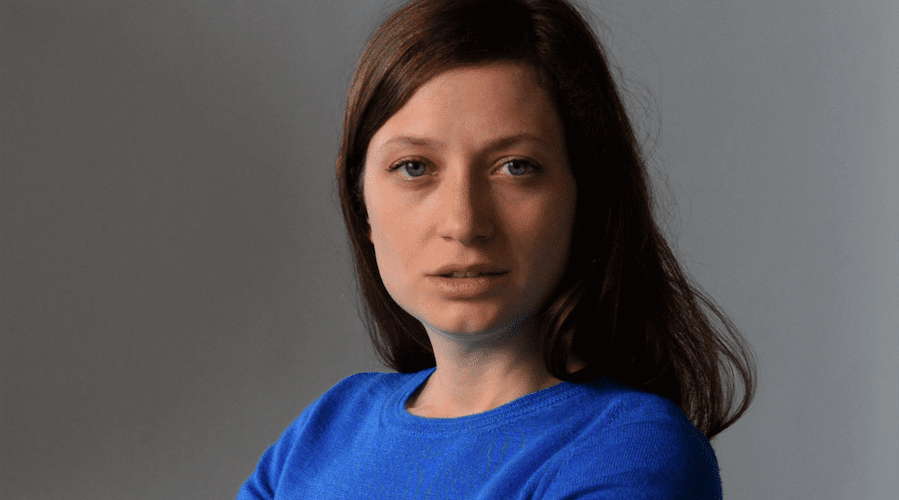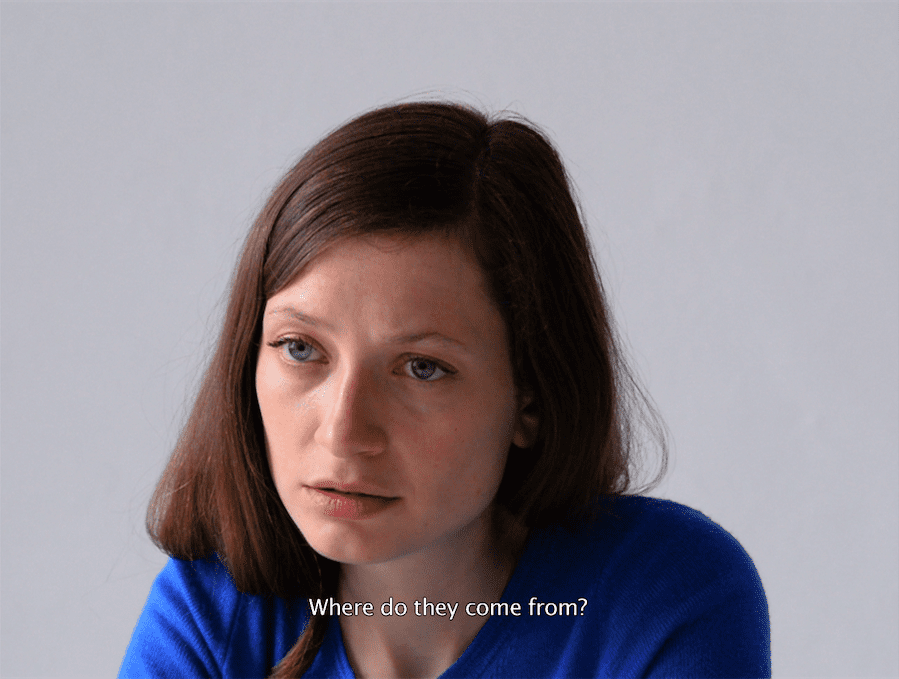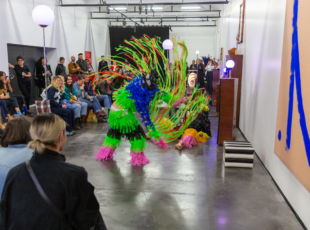Ariane Loze, theatrical videographer

Article author :
Ariane Loze’s name appeared on the contemporary art scene through her realist videos, which stand out for the quirkiness of their mood. Her most recent works to date interrogate algorithms, the way they function and their omnipresence in our daily lives.
Since 2008, Ariane, Brussels born and an inhabitant of the city, has been foregrounding the defining features of our society in her performance videos. Her short films lead us into her universe of shot and counter-shot, one she excels at knowing inside out. The artist plays the roles of all the characters in her scenarios on her own. She takes this further still, assuming the roles of scriptwriter, producer, then director, and finally editor. The only stage where she seeks a helping hand is post-production. Working in this way, she maintains total creative freedom, even if the workload is substantial. ‘It’s also because I was on my own with just my camera that I’ve been given access to numerous sites,’ she explains, having been given free rein in 2018 to produce a video in the Citroën garage which has since been transformed into the KANAL-Centre Pompidou.
From theatre to cinema, there is but a small step
Starting at the age of thirteen and throughout her secondary education studies, Ariane studied theatre at evening classes, in Brussels. Afterwards, she enrolled at the directing department at the RITCS. Having completed this training, the young woman felt that she lacked sufficient standing and was too young to manage a team. She began a postgraduate course in performance and never ceased analysing the narrative processes of cinema. She produced her first videos as exercises in filming shot and counter-shot. Being by herself, she placed herself on the stage and played all the roles.

Then there nevertheless followed a period of doubt: where could such one-of-a kind work find the place best suited for it? Too experimental for film festivals, her short films were twice given a slot at video art festivals. It was there that an exhibition commissioner steered her towards contemporary art. A milieu which to her seemed difficult to get into, but one where she quickly however made a name for herself. In particular due to her two years at the HISK (Higher Institute for Fine Arts), an artists’ residency, where she met several professionals of the artform, who encouraged her and whom she is still working with today.
I had wanted to embark on research from a sociological perspective. Even though my videos remain art
Ariane Loze
Society as seen by Ariane Loze
With an editing process which eschews special effects and is of great technical simplicity, Ariane Loze’s films allude to the world today. But they do so in their own manner. It was in 2017 that she developed the urge to undertake research in an almost sociological way. ‘Even though my videos remain art.’ It was the interim period between rounds of the French elections, when the candidates were all hovering around the 20% mark and few people wanted to vote, that she considered making a film on the subject of change. ‘Whether it be society in general or the human being as a person, everyone always wants transformation. But when it comes down to really making things happen, everyone draws back,’ the artist argues. ‘It was risky to talk about political engagement in a film, but I gave it a go. In the end this video, Impotence, represents pretty well the wavering indecisiveness which persists in our society. A lot of people identified with the characters.’

Art, a sociological eye and the digital
For her two most recent videos, one called If you didn’t choose A, you will probably choose B, and the other Our Cold Loves, the artist uses as her starting point the functioning of algorithms and dating apps. To immerse herself in the subject, Ariane met several researchers who specialise in this area, including the sociologist Jessica Pidoux, the dating coach Laurie Dutheil, and the mathematician Paul-Olivier Dehaye. These exchanges enabled her to sharpen the dialogue.
These two latest projects were for her an eye-opener regarding the enormous impact of digitalisation and the evolutions it is already bringing about. ‘Machines, which appeared in the eighteenth and nineteenth centuries, created the Industrial Revolution. The world changed. It will be the same with the digital revolution. For the moment we still have the feeling that it is all very practical. But we have not yet become aware that new mental and behavioural habits are already radically transforming society. We only see the advances which seem useful, but other processes which go hand in hand with them are already snapping shut on ourselves,’ she points out.
Love 2.0
In the course of her research, Ariane Loze came to realise that the users of dating applications must, first of all, learn to seduce the machine, before seducing the human being. ‘During her thesis work on dating applications, Jessica Pidoux analysed the Tinder patent whose matchmaking system is based on the theory devised by Arpad Elo. This scientist invented a process to enable chess players of the same level to meet one another,’ she explains. ‘But in love, it is more difficult to express this “of the same level.” It would mean putting together people who take yacht trips and then those who get around in city cars … all of it done by means of a system of points allocated on the basis of a questionnaire: “Do you do any sport?,” “Do you smoke?”… Depending on the responses, the user either wins or loses points. Afterwards, the “machine” creates a score and brings together people who have more or less the same results. But alongside that there is also the “sense of destiny”. Matches are also created between people who have things in common. These are detected via the algorithms in social networks and people’s particular interests. But the terrible conclusion of all this is clearly that the objective of the dating apps is not love but the selling on of personal data!’ observes Ariane Loze.
To discover the two latest videos, If you didn’t choose A, you will probably choose B and Our Cold Loves, the dates are February 3 at the Centre Culturel de Strombeek-Bever, from March 9 at the Galerie Michel Rein in Brussels and from March 25 at the Galerie Michel Rein in Paris.
A story, projects or an idea to share?
Suggest your content on kingkong.





